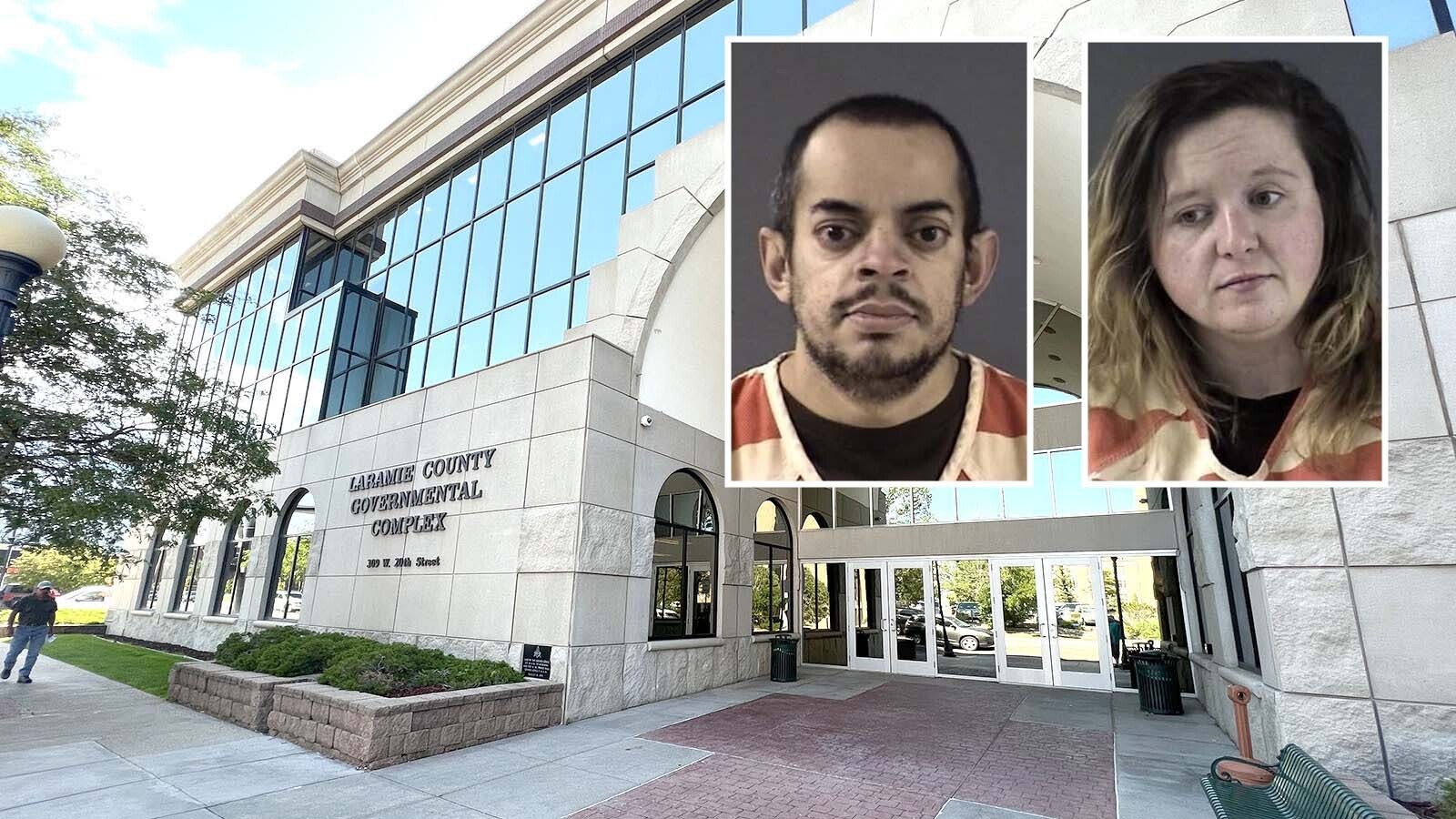In their latest parry with a Laramie church elder they banned from a forum on the University of Wyoming campus, two university leaders say the man isn’t like the First Amendment champions he’s citing.
Todd Schmidt is suing UW dean of students Ryan O’Neil and president Ed Seidel, saying they violated his free speech and due process rights by making him change a sign he displayed from his presentation table in the UW Student Union, and by banning him from the Union for a year.
Schmidt’s sign called out a specific transgender UW student who has been inducted into a sorority on campus. It read: “God created male and female and Artemis Langford is a male.”
O’Neil made Schmidt cover Langford’s name on the sign, and the university later banned Schmidt from the Student Union for a year.
That’s Not You
In their latest back-and-forth with Schmidt in the U.S. District Court for Wyoming, Seidel and O’Neil’s Monday filing says that Schmidt can’t claim discrimination from O’Neil in her individual capacity, because the case law he relies on doesn’t match his conduct.
Schmidt is suing O’Neil for “nominal” damages, or a small amount of money. In a July 24 filing in the case, Schmidt claims that he, not Langford, is the target of discrimination by the university.
The university leaders are asking U.S. District Court Judge Nancy Freudenthal to dismiss Schmidt’s claims against O’Neil in her individual capacity, saying O’Neil has qualified immunity as a government employee.
In earlier case law, the U.S. Supreme Court has ruled that government officials have qualified immunity barring lawsuits against them individually — but it does not apply if a reasonable person in the official’s shoes would have known she was violating someone’s fundamental right during the contested action.
Seidel and O’Neil are arguing that O’Neil couldn’t have known she was violating Schmidt’s rights when she asked him to change his sign because he doesn’t have a right to harass people, and because the case law Schmidt cited looks different from his situation.
The university officials have asserted all along that Schmidt’s speech wasn’t protected because it was, allegedly, harassment against Langford.
“The cases (Schmidt) cites are ‘so materially different’ from the conduct under review here that they cannot be read to place university officials on fair notice that such conduct violates clearly established law,” says Seidel’s and O’Neil’s filing.
In other words, the leaders are arguing that O’Neil couldn’t have thought she was discriminating against Schmidt based on his viewpoint because his case doesn’t resemble the relevant viewpoint-discrimination cases he cited.
Let’s Have A Look
Schmidt cited a handful of cases he alleges should have warned O’Neil not to censor him for his viewpoint.
One of them is Anderson vs. Creighton, a 1987 U.S. Supreme Court case. In that one, FBI agent Russell Anderson appealed to the high court after a federal appeals court denied him victory against the Creighton family, who sued because Anderson and other law enforcement officers searched their family home without a warrant while looking for a bank robbing suspect who wasn’t there.
In the end, the Supreme Court sent the case back down to the lower federal courts system, saying the courts needed to reevaluate the case based on whether a reasonable person in Anderson’s shoes would have believed he was about to violate someone’s Fourth Amendment rights.
How Anderson felt about the situation subjectively was irrelevant, the high court ruled.
Schmidt repeats this standard in his filings, holding O’Neil’s conduct to the reasonable person test.
O’Neil in turn argues that “a reasonable official is not on notice that asking an individual not to target a student based solely on her membership in a protected class could constitute a violation of the law.”
This Christian Newspaper
Schmidt cited Rosenberger vs. Rector, a 1995 Supreme Court case in which Justice Anthony Kennedy delivered a majority opinion saying the University of Virginia could not withhold its student activities grants based on a student organization’s religious viewpoints.
Ronald Rosenberger and other undergraduates in 1990 founded Wide Awake Productions, a contracted independent organization eligible to receive student funding for its activities. The organization sought to unify Christians and educate others about Christianity’s tenets. It published a school newspaper that commented on numerous issues ranging from Christian music to evil, racism, crisis pregnancies, stress, prayer and homosexuality.
The university denied $5,862 in printing funds to the group, saying it couldn’t fund religious activities.
The Fourth Circuit Court of Appeals decided that the university had discriminated against the group based on its viewpoint, but that it had a compelling government interest to do so, in the name of separating church and state.
The U.S. Supreme Court rejected that, saying the government didn’t have authority to discriminate against the group.
“Viewpoint discrimination,” wrote Kennedy, “(is) an egregious form of content discrimination. The government must abstain from regulating speech when the specific motivating ideology or the opinion or perspective of the speaker is the rationale for the restriction.”
The Burning Cross
Schmidt’s next case is R.A.V. vs. City of St. Paul, Minnesota.
In the pre-dawn hours of June 21, 1990, in St. Paul, a few teens crafted a crude cross from broken chair legs and burned it inside the fenced yard of a black family in the neighborhood of one of the teens.
Authorities charged a teen, identified as R.A.V., with a bias crime. The city ordinance made it a crime to place on public or private property objects one knows to arouse anger, alarm or resentment based on someone’s race, color, creed, religion or gender.
The Minnesota Supreme Court said the ordinance could fit within the First Amendment if authorities only applied it to “fighting words,” which aren’t protected by the First Amendment.
St. Paul bristled, saying the “fighting words” embargo wasn’t specific enough to protect historically marginalized groups from the targeted speech of others.
But the U.S. Supreme Court in 1994 said the law itself and St. Paul’s arguments for it betrayed the truth — that the law outlawed some kinds of speech based on content, while allowing other kinds. And that was unconstitutional, says the majority ruling by Justice Antonin Scalia.
“Let there be no mistake about our belief that burning a cross in someone’s front yard is reprehensible,” wrote Scalia. “But St. Paul has sufficient means at its disposal to prevent such behavior without adding the First Amendment to the fire.”
The government may have an interest in protecting historically marginalized groups, Scalia added, but there are content-neutral ways to do that without censoring people based on viewpoint alone.
Sidewalk Counselors, This Time
Schmidt also cited McCullen vs. Coakley, a 2014 U.S. Supreme Court case in which Eleanor McCullen and other pro-lifers sued Massachusetts Attorney General Martha Coakley.
McCullen challenged a Massachusetts law making it a crime to stand within 35 feet of an abortion clinic unless you were an employee. She and the other petitioners were “sidewalk counselors,” people who stand outside clinics and try to dissuade women from having abortions.
Coakley argued the buffer zones were necessary to maintain public safety and avoid clashes and driveway obstructions.
But every justice on the U.S. Supreme Court disagreed.
Chief Justice John Roberts delivered the majority opinion, saying police were capable of stopping law violators individually without ridding the entire sidewalk of protected speech.
Schmidt’s case is ongoing.
Clair McFarland can be reached at clair@cowboystatedaily.com.





